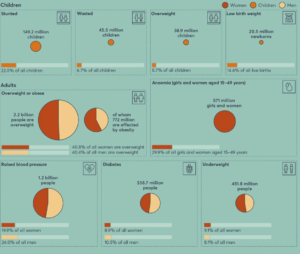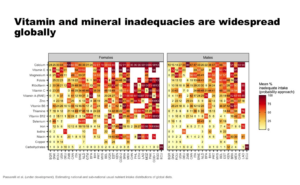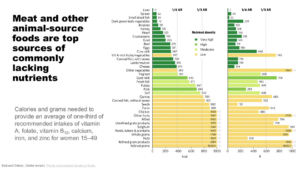I’m sure you’ve seen it before —that familiar sight at every interstate highway exit and in every major city across the United States— the unmistakable, overwhelming selection of fast food restaurants. Brightly colored buildings with open-plan parking lots draw you in, promising to deliver deliciously low prices and speedy service for all of your favorite, mouth-wateringly unhealthy foods. Sounds like a sweet deal, right?
The truth is, this convenience comes at a cost. In order to quickly and cheaply mass-produce enough food to fill the bellies of urban populations, crops must be grown and animals raised at industrial scales, depleting our soils of nutrients and enriching the fatty tissues of our meat with unstable, metabolically-damaging polyunsaturated fats. At every step of the commercial production process, stewardship over the consumer is lost while corporate profits are gained. The result? A growing population of sicker people.
How Did We Get Here?

Modern intensive agricultural methods like tilling, monocropping, and synthetic fertilizer use destroy soil biodiversity and disrupt root systems, tending to withdraw nutrients from the soil with each harvest to maximize crop yields. These profit-prioritizing practices not only affect the nutrient quality of our food, but also expose us to potentially harmful compounds. Runoff from excess fertilizer, immunogenic GMO proteins, and residual pesticides left when crops are harvested pose potentially significant threats to human health.
Though crop yields have increased along with the rise of the modern agribusiness model, the average concentrations of nutrients in crops have steadily decreased. According to this 2004 study using USDA nutrient content data, cultivated fruits and vegetables faced median declines between 5-40% in calcium, phosphorus, vitamin B2, and vitamin C content between 1950 and 1999. These valuable nutrients are unfortunately not a priority when plant breeders select for high-yield crops, nor when industrial croppers till their fields.
When it comes to “food” here in the U.S., we’re technically producing a massive surplus. But what good is “food” if your body can’t use it to keep you nourished? The Oxford dictionary definition of food is “any nutritious substance that people or animals eat or drink or that plants absorb in order to maintain life and growth.” Now I know this is just ONE definition, but do we really believe that the ultra-processed junk we’re being served at chain restaurants and in plastic packages at grocery stores and gas stations is doing a good job of providing the nutrition we need to maintain life and growth (well, cancer growth maybe)? Considering we consume more than half of our daily calories from ultra-processed products made with nutrient-bereft refined flours and industrial seed oils, you don’t exactly have to be a Registered Dietitian to understand why so many of us are undernourished.
But food ought to be nourishing. True hunger for nutrients is not necessarily a fundamental issue of our food production capacity. It is an issue of twisted priorities, as determined by industry and its political puppets. In this warped world, profit is king, with human health at his mercy.
If we want to fix our mistakes and move towards a more sustainable future, we must ask ourselves this question: should we prioritize the production of human “feed” or human food?
Why We Need Nutrients Instead of Human “Feed”
While calories in the form of carbs and fat aren’t necessarily all that hard to come by here is the U.S., a 2017 study conducted by the National Health and Nutrition Examination Survey (NHANES) revealed that deficiencies in vitamins A, B6, B9, B12, C, D, E, and iron are actually quite common, and not just in low- and middle-income countries. In fact, the researchers found that 31% of the U.S. population is at risk for at least one vitamin deficiency or anemia, 32% have an insufficient vitamin B6 intake. 61 % of adults and 90% of teens don’t get enough magnesium, and 95% of adults have an inadequate vitamin D intake.
Vitamins and minerals serve as necessary coenzymes and cofactors in metabolic processes. Without sufficient amounts of these nutrients, it becomes very difficult for your body to repair damage properly, or respond to daily stressors. While Recommended Dietary Allowance (RDA) values may be helpful for some, they often underestimate the nutrient requirements of athletes, pregnant women, or chronically ill individuals, whose bodies are under more stress and will likely have higher nutrient demands.
Nutritional status is especially important for pregnant women and young children. The “first 1,000 days” between conception and a child’s second birthday have the potential to shape that child’s development. Failure to provide a growing child with key nutrients (especially protein, iron, zinc, choline, iodine, and vitamins A, D, B6, B9, and B12) during this critical period may result in lifelong health issues and cognitive impairment despite subsequent nutrient repletion.
Undernourishment is a Global Issue

Source: Global Nutrition Report 2021
Billions of people around the world are under or malnourished. According to the 2021 Global Nutrition Report, there are over 570 million anemic women of reproductive age and nearly 150 million stunted children worldwide. A 2014 UN study concluded that a billion people do not consume enough protein. In some low-income countries, diets contain significantly inadequate amounts of over 10 essential micronutrients.

In sub-Saharan Africa, the consumption of ultra-processed foods is climbing at the expense of fresh and minimally processed foods, much to the delight of the processed food industry, whose global encroachment has generated major profits. The industrialization of food production, processing, and distribution has been followed up by a decrease in smallholder farming and dietary diversity, as well as an increase in household dependence on purchased foods. The catastrophic result has been diets that are low in nutrient-density (specifically protein, vitamins and minerals), yet high in energy-density (calories), much like what we see here in the U.S. today.
In Africa, this process has yielded multiple burdens of malnutrition, as high levels of undernutrition are coupled with a growing burden of obesity and chronic disease. According to the WHO, although the prevalence of premature deaths and disability related to communicable diseases has declined, the number of overweight children under 5 years of age is increasing along with population growth. Meanwhile, diabetes, chronic respiratory diseases, chronic kidney disease, cardiovascular diseases, cancers, and mental and substance use disorders are on the rise across sub-Saharan Africa.
Animal Foods are the Keys to Optimal Health
Though I’ve covered the subject many times, I cannot stress enough that the value of animal-source foods in the diet must not be overlooked. Animal foods like meat, organs, eggs, dairy, and seafood are the top sources of vitamins, minerals, and proteins commonly lacking in diets around the world. They contain unique nutrients like retinol, heme iron, and vitamin B12, and boast complete, bioavailable amino acid profiles. As we replace these foods with ultra-processed products like pre-packaged potato chips and nutrient-bereft nut milks, diet quality decreases while we are driven to over-consumption in search of proper nutrition.

With a subpar nutrient intake, your body will have a tougher time repairing itself and maintaining a healthy metabolic state. This perpetuates a dangerous cycle, as the more stress you are under (whether it’s poor diet, lack of sleep, injury, infection, emotional trauma, lack of sunlight, etc.) the less efficient your body becomes at repairing tissues, often necessitating an even greater input of nutrients.
What Does Our Future Look Like?
An unhealthy world is an unsustainable world. As we saw with our recent pandemic, those suffering from poor metabolic health were among the most impacted by COVID. Nonetheless, government policy and media coverage chose to zero in on profitable pharmaceutical solutions, rarely touching on the importance of dietary or lifestyle changes.
As global chronic disease burdens continue to climb, increasing pressure will be placed on healthcare infrastructures to support the growing number of individuals who are getting sicker at a younger age. Global agribusiness and policymakers are pushing for a more plant-based solution, but is this really the key to securing human and planetary health? Do we want to facilitate a greater reliance on nutrient-poor human “feed”, designed from destructive monocrops and converted into ultra-processed, overpriced protein bars with profit margins that line the pockets of Nestle, Unilever and Bill Gates?
Though I doubt that the U.S. government will magically switch its corn and soy subsidies overnight, the growing number of folks I’m talking to every day who are passionate about developing sustainable solutions like real food grown in regional systems is really encouraging. Even something as simple as striking up an engaging conversation with friends and family or supporting a responsible local producer goes a long way towards shifting our focus away from highly centralized food systems towards more local, regenerative ones. Swaying the hearts and minds of international conglomerates is easier said than done, but we’ve got to start somewhere.









2 thoughts on “The Curse of Plenty: Overfed and Undernourished”
This was a really excellent post, very well said. Thank you for all the work you do, please keep it up!
A WOMAN AFTER MY OWN HEART. If only more of us chose to take responsibility for our own health instead of giving that privilege to a Pharma brainwashed general practitioner.
Thank you, sending heart felt gratitude for all that you and your team do.